With new cars prices on the rise, we compare 2022’s pricing over the years to see whether it’s true or false.

You’re not the only one screaming “how much!?” when looking at the price of a new car online.
With the pandemic, chip shortages and other nefarious behaviour resulting in ballooning prices, buying a new car is moving every further into the territory of ‘unaffordable’ for most average Australians.
Throw in record inflation and the Reserve Bank of Australia’s current interest rate hikes and it’s becoming harder than ever for some to justify buying a new car.
We pondered this thought and began looking at how much cars cost over the past 20 years. Given inflation is running away at a rate faster than your own mental barometer on ‘value’ can adjust to, maybe new cars are not as expensive as they first seem on paper?
So, with the help of the RBA’s inflation calculator, let’s compare cars from the past 20 years to see if we truly are paying more, or maybe even less.
Mercedes-Benz C-Class


The Mercedes-Benz C-Class is your staple luxury mid-size sedan.
It, and its predecessors, have been offered in Australia for over 30 years now, so we all know roughly what one is. Back in 2002, a Mercedes-Benz C200 Avantgarde was priced at $68,974, or the equivalent of $114,253 in 2022’s money.
Standard kit included a supercharged 2.0-litre four-cylinder engine with 120kW/240Nm, five-speed auto, electronic climate control and half-leather seats.
Now, an entry-level 2023 Mercedes-Benz C200 starts from $81,700 before on-roads or costs.
And you get way more standard kit now too, like the brand’s latest ‘MBUX’ twin-screen infotainment system, radars, cameras and driver assist systems the 2002 car could only dream about. Comparatively, the new car priced a lot cheaper than the old car in today’s money.
Honda Civic Type R


The 2006 Honda Civic Type-R was a cracker.
Yours truly owned a Championship White version is his youth and loved every minute of it. Powering it was the brand’s legendary high-revving ‘K20A’ 2.0-litre engine that sent drive exclusively to a six-speed manual with limited-slip differential.
Inside, there were sporty bucket seats, bluetooth connectivity for your phone (remember that?) and a dual-gauge cluster with dedicated digital speedo and a light to indicate when you hit VTEC.
It cost $39,990 in the last year of production in 2006, or the equivalent of $59,246 using the RBA’s inflation calculator set to 2022.
Today, the 2023 Honda Civic Type R is set to go on-sale for $72,300 drive-away – making the new car more expensive by comparison.
Toyota LandCruiser


Toyota’s LandCruiser is synonymous with Australia.
You see them around town, you see them in the outback, and you’ll see them as far as large open-pit mines on the west coast of Australia, too. Originally a utilitarian vehicle designed for hard yakka, Toyota has slowly broadened the LandCruiser’s ability and appeal over the years.
And, if they’ve made the new 2023 Land Cruiser 300 series too soft for you, the brand still sells its antiquated 70 series LandCruisers new in our country, just in case.
However it’s the 100 series that interests us most today. The 2002 Toyota LandCruiser GXL – fitted with Toyota’s legendary 4.2-litre 1HD-FTE diesel engine – used to cost $72,334 when new, or the equivalent of $119,819 before on-road costs.
Now in 2023, a current 300 series Toyota LandCruiser GXL will set you back $104,481 – making the new car decently affordable compared to the old.
In terms of product, it’s night-and-day; with the new 300 series LandCruiser offering luxuries like a 10-speed auto and a mighty 227kW/700Nm to play with from a 3.3-litre V6 twin-turbo diesel.
Ford Ranger


One of Australia’s favourites has only been a thing since 2006.
It was the first year we saw the ‘Ranger’ badge, with Ford’s ‘Courier’ nameplate retired the year prior to make way. Back in 2006, a Ford Ranger XLT dual-cab with five-speed manual transmission – as no auto was offered – cost $45,990, or $68,135 in 2022’s dollars.
Now, a 2023 Ford Ranger XLT dual cab auto – ironically there’s no manual on offer now – is priced at $61,990. If that’s not enough, you could even walk-up into a 2023 Ford Ranger Wildtrak for $67,990 and still be better off in 2022’s money.
Goes to show you how volume helps support lower prices, as back in 2006, Ford sold just 7230 Rangers.
In 2022 alone Ford sold 47,479 Rangers, representing an increase of 556 per cent versus its first offical year on sale.
Toyota Yaris


We finish with the Toyota Yaris.
Back in 2002, you could grab a Toyota Echo (Australia’s Yaris) with four-speed auto for $19,590. When converted into 2022’s money, that’s $32,450.
Now, an entry-level 2022 Toyota Yaris Ascent Sport costs $24,640 before on-road costs. Where the old car was quite-literally four steel wheels – no alloys here – and a plastic steering wheel, the new car comes loaded with tech.
That includes autonomous emergency braking with pedestrian detection, lane-keeping assist, rear parking sensors and rear-vision camera, eight airbags and plenty more.
Although some cars feel expensive in 2023, some are actually fair value for money.
| Model | Price when new in 2002 | Adjusted for inflation | Price new today |
| Mercedes-Benz C-Class | $68,974 | $114,253 | $81,700 |
| Honda Civic Type R | $39,990 (2006) | $59,246 | $72,300 |
| Toyota LandCruiser | $72,344 | $119,819 | $104,481 |
| Ford Ranger | $45,990 | $68,135 | $61,990 |
| Toyota Yaris | $19,590 (Echo) | $32,450 | $24,640 |
The post Was your new car more expensive 20 years ago? appeared first on Drive.
0 Response to "Was your new car more expensive 20 years ago?"
Post a Comment